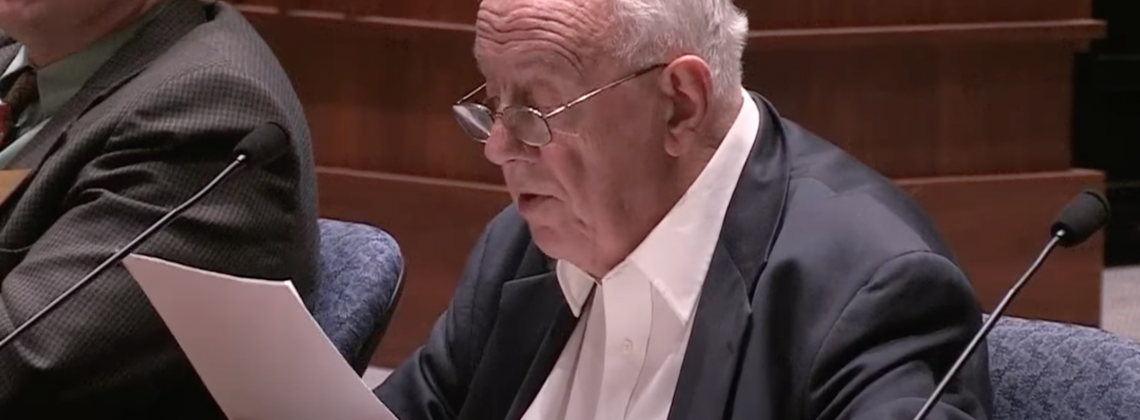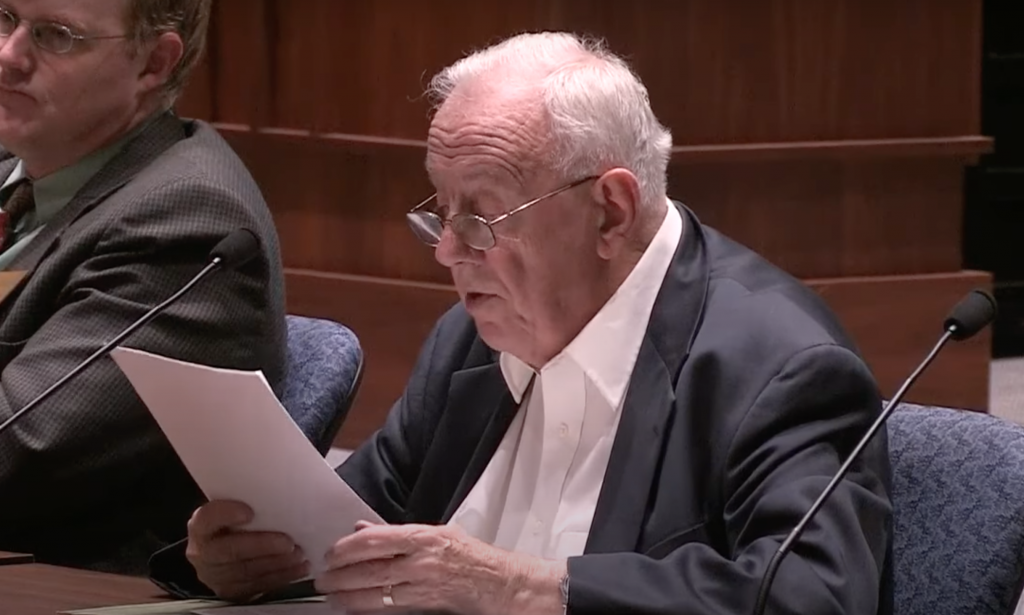

Alasdair MacIntyre exposed the failings of the liberal tradition. Do we dare remember?
Alasdair MacIntyre: An Intellectual Biography by Émile Perreau-Saussine. University of Notre Dame Press, 2022. 216 pp., $40
Alasdair MacIntyre is one of the most significant public intellectuals of the last half century. A moral philosopher by training, MacIntyre is the author of a series of highly influential works calling into question the basic assumptions of his discipline as practiced since the Enlightenment. In them MacIntyre presents the failings of moral philosophy as symptomatic of the broader failure of what he dubbed “The Enlightenment Project”: the rationalistic intellectual, social, and cultural norms that have shaped modern life in the West. Unlike the critics of the Enlightenment associated with various strains of postmodernism, MacIntyre drew his inspiration from the intellectual resources of pre-modernity, in particular the Aristotelian-Thomistic tradition of virtue ethics. Those who sensed a Catholic ambiance in his breakthrough work, After Virtue (1981) had their hopes (or fears) confirmed when MacInytre converted to Catholicism in 1983.
As a Catholic undergraduate entering secular graduate school in the 1980s, I found MacIntyre an inspiration. But I was never clear exactly from where his spirit blew. As I followed the debate over his work I gained little sense of how a secular academic and former Marxist could turn to Thomism as a guide to modern problems. I have myself to blame if some revealing biographical sketch flew under my bibliographic radar, but I am happy to at last have some of my questions answered by the recently published English translation of Émile Perreau-Saussine’s Alasdair MacIntyre: An Intellectual Biography. Perreau-Saussine, who died in 2010 at the age of thirty-seven, was a fellow at Fitzwilliam College, Cambridge and best known in the United States for Catholicism and Democracy: An Essay in the History of Political Thought (2012). His prize-winning first book on MacIntyre, originally published in 2005, took many more years to reach an English language audience. Its treatment of MacIntyre’s religious struggles and his journey to the Catholic Church is perhaps it strongest part, and will be a revelation to anyone accustomed to a more narrowly philosophical approach to MacIntyre’s ideas.
Alas, those looking for a thick description of the influence of life circumstances on MacInytre’s intellectual development will be disappointed. This book is decidedly, almost egregiously, more “intellectual” than “biography.” I understand the genre and had hoped only for a conventional chronologically organized account that would bring the reader through the stages of MacIntyre’s intellectual development. Instead, Perreau-Saussine organizes the book thematically, dividing it into three sections: “Politics,” “Philosophy,” “Theology.” The overlapping nature of these themes in MacIntyre’s work results in many repetitions, often with little real intellectual development, particularly in the first two sections. The treatment of these ideas, furthermore, assumes a basic familiarity with MacIntyre’s writings—and oh, by the way, the writings of every major Western intellectual in the Twentieth Century. I have studied enough of these thinkers to decode Perreau-Saussine’s intellectual shorthand, but I cannot really recommend the book to those who wish to dip their toes into the waters of MacIntyre for the first time.
That being said, I found the treatment of MacIntyre’s life and thought in the decades immediately after the Second World War informative and illuminating. Perreau-Saussine traces the roots of MacIntyre’s moral philosophy to his need as a young British Marxist to fashion a credible moral critique of Stalinism. Marx had long taught that morality is just an illusion designed to give legitimacy to bourgeois property interests; it is, like religion itself, an “opiate of the people.” Stalin justified the murder of millions in the name of the revolution, a truth beyond morality; MacIntyre, along with other Marxists of his generation, began groping for a moral language capable of placing limits on revolutionary violence without falling into the trap of bourgeois moralism.
Rejecting both Marxist and liberal universalisms, MacIntyre found an alternative in the writings of the Austrian-British philosopher Ludwig Wittgenstein, especially those writings published posthumously in 1953 as Philosophical Investigations. This work showed Wittgenstein in rebellion against another Enlightenment universalism, logical positivism, which sought to discern the “true” meaning of words through pure logical analysis, free from all external contexts. As an alternative Wittgenstein proposed that words have meaning only in specific linguistic contexts with specific linguistic rules, which he called “language games.” MacIntyre admired the coherence and clarity of Wittgenstein’s proposals but feared they led too easily to a kind of relativism, with no possibility of rational communication across language games—a problem he later grappled with through his concept of the “incommensurability” of different traditions. He found a way out in the work of Elizabeth Anscombe, a Catholic student of Wittgenstein’s who had discovered in Aristotelian Thomism a corrective to the relativistic trajectory of Wittgenstein’s thought. Perreau-Saussine’s account of this intellectual genealogy, to which I cannot do justice, is one of the true strengths of the book.
So too his account of MacIntyre’s involvement with the early British New Left. Disillusioned by Stalinism, other committed Marxists looked for alternatives in history. Historians and literary scholars such as E.P. Thompson and Raymond Williams re-wrote the Marxist progressive narrative of history and focused on the true losers of industrial development: the peasants of pre-industrial Europe. Marx famously dismissed “the idiocy of rural life,” but these self-styled neo-Marxists came very close to dismissing the idiocy of industrial life. MacIntyre shared this attraction to the pre-modern world, which was also, of course, a very Catholic world. Wittgensteinian language games fused with pre-modern communal ideals and practices to provide MacIntyre with a philosophical social alternative to modernity. In these early years he crossed paths with the Franco-Canadian philosopher Charles Taylor, who was seeking his own alternative to the relentless march of liberal modernity. The two would become Catholicism’s “twin towers” among public intellectuals in the 1980s and beyond.
The increasing irrationalism of the youth movement of the late 1960s led MacIntyre to abandon the New Left and Britain itself, moving to the United States in the early 1970s. Aside from the intellectual influence of Anscombe, the Catholic vision that emerged clearly in the 1980s had its roots in MacIntyre’s long-term struggle with a variety of British Christian traditions. True, this was in one sense clear from the title of one of his well-known early works, Marxism and Christianity (1968). Still, in this study of Christian ideas he gives no indication that he once considered becoming a Presbyterian minister. During the Protestant period of MacIntyre’s engagement with Christianity, his general anti-liberal orientation naturally drew him to the work of Karl Barth, the leader of the so-called “neo-orthodoxy” movement within Protestantism. MacIntyre fully embraced Barth’s critique of liberal Protestantism as reducing God to rational principles and thus making him superfluous, irrelevant. Still, MacIntyre remained a man dedicated to some form of reason; in the end, he could not accept the neo-orthodox rejection of philosophy. Perreau-Saussine writes, “By insulating itself, by insisting on its specificity, and even its . . . paradoxical (Barth) character, theology protects itself. But, according to MacIntyre, this invulnerability has a cost: senselessness” (142). MacIntyre found his alternative, his synthesis of faith and reason, in the Catholic Church—not simply in some esoteric expression of the faith acceptable to the ego of a modern intellectual but institutional expressions of the Church’s intellectual vision in papal documents such as St. John Paul II’s Veritatis Splendor (1993) and Fides et Ratio (1998).
All this being said, Perreau-Saussine comes across as respectful but not persuaded. He writes as a liberal committed to the liberal project, convinced that its institutional resilience more than compensates for its intellectual incoherence. He seems to appreciate MacIntyre’s efforts to remind liberals of the deficiency of their concept of the good, the lack of a sense of community beyond that of a voluntary association of individuals, and more. Still, in lieu of a political alternative, MacIntyre appears as little more than a necessary cage rattler to keep liberalism honest—that is, to keep it aware of its deficiencies and contradictions, in particular its simultaneous denial of universal “goods” and assertion of universal “rights.” Perreau-Saussine’s affirmation of liberalism in the face of these contradictions left me wondering why he bothered to devote so much attention to MacIntyre’s work. In this, his fascination with MacIntyre recalls nothing if not the relation of Herod to John the Baptist: He spends much of the book restating the arguments surrounding MacIntyre’s critique of utilitarian and rights-based liberalism, arguments that always point to the incommensurability and relativism that MacIntyre feared once he moved toward Wittgenstein. Yet in the end, liberalism, for Perreau-Saussine, is right because it works.
Beyond the issue of liberalism, I would judge MacIntyre’s ultimate turn to the Catholic tradition as his own recognition of the limits of philosophy itself, though he continues to argue as a philosopher and continues to be cornered by critics on the issue of incommensurability. I read MacIntyre’s works as a kind of modern Summa Contra Gentiles directed at a much broader range of gentiles who lack the philosophical common ground Thomas could assume of his Muslim and Jewish interlocutors. Such a variety of rationalities makes it clear that every form of reason depends on some form of faith. This points us to an intellectual world after philosophy as understood by the modern world.
Christopher Shannon is associate professor of history at Christendom College in Front Royal, Virginia. He is the author of several works on U.S. cultural history and American Catholic history, including American Pilgrimage: A Historical Journey Through Catholic Life in a New World (2022), available now from Ignatius Press.